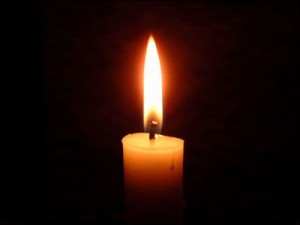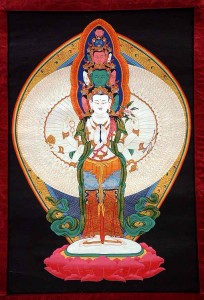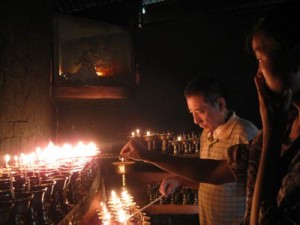The following is an excerpt from a teaching by Jetsunma Ahkon Lhamo called “Bringing Virtue Into Life”
We can live our lives as the walking dead, and then die, unprepared, like going to a continent filled with precious jewels and coming back empty-handed. Or, we can switch on the lights, face facts and do what it takes to negotiate the shoals of samsara, as painlessly as possible.
The Buddha teaches us that we should think of our lives as like a burning room and that the smoke is beginning to choke us, fill us up. And you know, if you’re in a burning room, eventually you’re going to get burned. It’s going to consume you, right? So think of ourselves as being in a burning room, and think that there is one door. That door is wide open to you. Do you get that? It is wide open to you. That door is the door of Dharma. There is one door by which to escape and you can walk out that door. You should think of the very doorway of that door as being your own root teacher. That is the implement, the tool, that you should use to get out of that room—your teacher, your practice, Dharma.
If you were in a burning room right now, and your skin was beginning to crackle and the smoke was beginning to overcome you, how would you think about that door? With fervent regard, the way we are instructed to think about our practice. That door would look pretty much like God to you! That door would look like the best thing you ever saw! Every breath of air that came through that door would be sweeter than anything you have ever known because that door is freedom.
You should think about your practice that way, because that is the way it is. That is the way it is. In samsara here, we are locked in a burning room and there is a door. And we have the great good fortune of not only seeing that door, but having the capacity to exit through that door. Not only that, but that door has a door sill that is friendly and helpful and appropriate for the size and shape of our bodies that will help us to exit that room comfortably. And that’s how we should think about our practice. Number one, wake up. Number two, get the big picture. Number three, act as though you were a sane and reasonable person, which most of us don’t. We don’t act like sane and reasonable people.
I’m not telling you anything you didn’t know. You know that life is impermanent. You know that you have suffered, and you know that you feel unable to really face all these things because it seems so hard to simply live a virtuous life. But I can tell you that it’s like anything else that you do as a friend for yourself that’s good for you, such as changing your diet to really nutritious food. At first when you do that, you know how it is. When you’re young, you can eat anything. You have a cast iron stomach. I mean the things I ate when I was young I can’t even look at now. Now I’m 45 years old and I have to eat right. If I don’t eat right, I don’t feel good.
But do you remember what it took to change into learning how to live well in that regard? To go from eating the food that I liked to eating the food that I have learned to like was hard, and I didn’t want to do it. I didn’t think I was up to it. And to go from the kind of activity that I engaged in when I was younger… Oh I could stay up all night if I wanted to, every night if I wanted to. I was blazing. I was a crazy girl. But now, if I don’t get a certain amount of sleep, the next day I’ve got bags down to my knees. You know, it’s horrible what life does to you! You look terrible and your whole face shows it. You feel awful. You feel like a dog. You feel worse than a dog.
So how did you feel when you had to change from those old habits to these new habits? At first it was painful. You didn’t want to do that. You didn’t want to change. When you learned that your body was going to fall down if you didn’t exercise, you started to exercise. At first, you hated it. You hated it. Nobody likes it when they first start to exercise. It’s painful. Your body doesn’t want to do that. But then when you finally do start to exercise, your body likes it and loves it and it feels good.
Living a virtuous life is like that. The decision to live a virtuous life is painful at first because you have to face the facts, and the facts are you’re dying. You’re dying on the hoof, right now. The second fact is that if you engage in virtuous activity you’ll be happy, and if you engage in nonvirtuous activity, you will be unhappy. That is not something we want to face. We want to do what we do, effortlessly, la la la la la, like little children. We don’t want to examine ourselves. We don’t want to look at what we do, but once we have done that,I’ve found, and many of us who are practicing for some time now have found, that we come to love our practice. We come to deepen in it and truly love it. We come to love the life of Dharma. We come to love a life that is engaged in bringing benefit and happiness to others. We come to find out at last that we never, not for a moment, liked ourselves when we were living the other way, the nonvirtuous way, the no-brainer. We never liked ourselves. There was no self-esteem happening there at all.
So then my suggestion is that we get started. Go through it. Buck up little soldier! Do what it takes to stand up tall and open your heart and get the big picture. Once you do that and you start to engage in a virtuous life, your mind will be smoother, you will be happier. You will be happier. This I promise you.
In the meantime, because our minds work the way they do and because we can’t see the direct relationship between cause and effect, we have to listen to our teachers. There is no other choice. Our teachers have crossed the ocean of suffering, just as the Buddha has done. Crossed the ocean of suffering, and returned for our sake. Our teachers, having seen the further shore and having seen the journey there and back, have come back to bring us this understanding. Live this way. Bring your life to the pinnacle of what it can be, and hold it steady and grow up, because that’s what it takes to be happy.
Copyright © Jetsunma Ahkon Norbu Lhamo. All rights reserved









